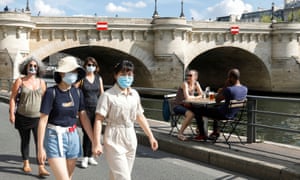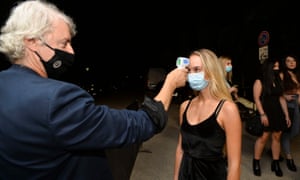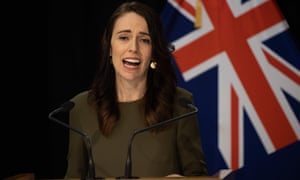
[ad_1]
Japanese PM Shinzo Abe checks in to hospital

Justin McCurry
Japan’s prime minister, Shinzo Abe, has checked into a hospital in Tokyo, local media reported on Monday morning, for what aides described as a “regular check-up”.
That is unlikely to dampen speculation about Abe’s health, however. The 65-year-old has looked tired and drawn in recent weeks, and suffers from a chronic bowel condition – for which he takes medication – that partly brought his first term as prime minister to a premature endin 2007, after a year in office.
Abe’s visit to Keio University Hospital on Monday came a day after the former economy minister, Akira Amari, told a TV programme that the prime minister needed some rest.
Abe has come under fire for not holding regular press briefings on Japan’s response to Covid-19 amid a resurgence in cases in Tokyo and other parts of the country. His plans for a short summer break last week were derailed by the governor of Tokyo, Yuriko Koike, who called on Tokyo residents to avoid all but essential travel outside the capital.
Speculation about Abe’s health has been growing since a weekly magazine reported earlier this month that he had vomited blood in July.

Japan’s Prime Minister Shinzo Abe has checked in to hospital according to local Japanese media. Photograph: Issei Kato/Reuters
Mexico records nearly 4,500 new cases
Mexico’s health ministry reported on Sunday 4,448 new confirmed cases of coronavirus infections and 214 additional fatalities, bringing the total in the country to 522,162 cases and 56,757 deaths.
The government has said the real number of infected people is likely significantly higher than the confirmed cases.

Members of the Star Wars fan club deliver food and sodas to relatives of patients hospitalised in Merida, Yucatan state, Mexico. Photograph: Hugo Borges/AFP/Getty Images
China reports no new cases in Xinjiang
China has reported no new local coronavirus cases in the western region of Xinjiang on according to national data, marking the first time the area’s case count was zero since mid-July.
Nationally there were 22 new coronavirus cases in the mainland for 16 August, compared with 19 cases a day earlier, the health authority said.
All of the new infections were imported cases, the National Health Commission said in a statement. There were no new deaths.
China also reported 37 new asymptomatic patients, compared with 16 a day earlier.

A medical worker swabs throat of a child for nucleic acid test in Urumqi, Xinjiang. The city reported no new cases on 16 August. Photograph: China News Service/Getty Images
Gladys Berejiklian has also made an apology for mistakes made over the Ruby Princess cruise ship, which docked in Sydney in March. Passengers were allowed to disembark despite several exhibiting flu-like symptoms.
Gladys Berejiklian said:
Can I now apologise unreservedly to anybody who suffered as a result of the mistakes that were outlined in the report undertaken by individuals within the health department or the health agency and I extend that apology unreservedly.
In particular to the 62 people who got the virus in secondly or tertiary way.
Those 62 people who weren’t on the ship but somehow contracted the virus as a consequence of that disembarkation.
And I want to say I can’t imagine what it would be like having a loved one or being someone yourself who continues to suffer and experience trauma as a result and I want to apologise unreservedly that – to anybody who is continuing to suffer or has suffered unimaginable loss because of mistakes that were made within – within the health agencies.
You can follow all of our Australian live coverage on our Australia blog below.
In the neighbouring Australian state of New South Wales – the country’s most populous – the premier, Gladys Berejiklian has spoken about her anxiety over containing community transmission:
While the case numbers have been pleasingly declining, my anxiety remains the same, if not slightly higher, because every week we have had undetected or unsourced cases.
Health is working overnight 24/7 to find the genomic links or find those links between the cases that don’t have a known source and existing clusters.
I mean, potentially the virus is continuing to spread in particular parts of south-western and western Sydney and that is a big concern because if you look back to Melbourne, Melbourne didn’t get worse because of the number of cases they had, they had undetected community transmission which then unknowingly got to a stage where it did – it did form a number of different clusters and we certainly don’t want that to happen here in New South Wales.
New South Wales has had much smaller numbers of community transmission, with cases under 10 on each of the past four days.
Just a quick update from the two other press conferences that have been going on – both in Australia:
First to Victoria, where we have learned more details of the 25 Victorians who died in the last 24 hours, on Australia’s deadliest day:
- One man in his 60s
- Four women and three men in their 70s
- Six women and four men in their 80s
- Four women and three men in their 90s.
Twenty-two of those 25 fatalities are linked to aged care outbreaks.
There are 657 Victorians in hospital – 44 of those are receiving intensive care and 32 of those 44 are on a ventilator.
Bloomfield praises those New Zealanders who have come forward to be tested:
“It’s been very heartening to see the number of people coming forward to get tested,” Bloomfield says.
Bloomfield says there are now 78 cases active in NZ, 58 of which are from the Auckland cluster discovered last week. The twenty other cases are in managed isolation quarantine facilities and are imported.
Five people are receiving hospital care, all of whom are connected to the cluster.
Updated
Nine new Covid cases in New Zealand
We are about to hear from New Zealand’s director general of health, Ashely Bloomfield, on the growing cluster of cases in Auckland – as of Sunday there were 49 community transmission cases.
In case you missed it earlier, the PM, Jacinda Ardern, delayed the country’s election this morning from 19 September to 17 October.
Bloomfield says there are 9 new cases in the community. Seven of them have been linked to previous cases in the Auckland cluster. Two are under investigation. He says they are believed to be linked to the cluster.
There have been four new Covid-19 deaths in Palestinian refugee camps in Lebanon, according to the UN Palestinian refugee agency.
This brings to eight the total number of Palestinian refugees who have died from coronavirus since Lebanon first recorded an outbreak of the virus in February.
Over 200,000 Palestinian refugees live in Lebanon, the majority living below the poverty line, according to UN. Their right to work and own property is restricted.
The UN agency, which provides health and education services to Palestinians across the region, called for vigilance in observing measures to combat the spread of the virus in the densely populated camps.
“If prevention is not adhered to, things may get out of control in the Palestine refugee camps in Lebanon,” the statement said.
A UNRWA spokesperson told AFP that particular concern focused on the largest, most-populous camp of Ain al-Hilweh, near the southern city of Sidon.
Lebanon has seen a spike in coronavirus-related cases and deaths, including 439 new infections on Sunday alone. That brought the total number of infections to 8,881 cases, including 103 deaths since the start of the outbreak in February.
A planned return to lockdown was abandoned in the wake of a massive explosion that ripped through large parts of Beirut on 4 August, forcing thousands of people to seek medical attention at the capital’s already overwhelmed hospitals.
We are expecting two press conferences in Australia in about 10 mins (from Victoria and NSW) and also one from New Zealand. I’ll do my best to wrap them all up for you.
In India, there are growing fears of an “invisible catastrophe” unfolding in the country’s rural villages.
Some 600 million Indians live in in rural areas and data from the National Family Health Survey-4 showed that only about 25% of of them have access to public outpatient healthcare.
There are also grave concerns for around 70% of India’s elderly population, who live in villages. Co-morbidities abound and are often left untreated because medical services are far away.

Covid-19 patient Parsada Sah, 67, a shopkeeper, lies on a hospital bed as his wife Vimla Devi, 62, sits next to him in an emergency ward in Bhagalpur, Bihar state, India. Photograph: Danish Siddiqui/Reuters
In the eastern state of Bihar, one of India’s poorest areas where around a third of people live below the poverty line, 90% of the population lives in villages. It has only one bed and just under 4 doctors per 10,000 people according to the 2019 National Health Profile. At the best of times, it struggles to deal with viral fevers or dengue outbreaks.
You can read our full feature on the crisis facing rural India from the Guardian’s Amrit Dhillon, below.
Updated
France reports 3,000 cases for second day running
France’s health ministry on Sunday reported 3,015 new coronavirus infections over the last 24 hours, the second day in a row in which new cases have surpassed the 3,000 mark.
However, the daily count was below the 3,310 cases reported on Saturday that marked a post-lockdown high.
It’s led authorities in the country’s two biggest cities, Paris and Marseille, to expand zones where wearing a mask is mandatory outdoors, while the government is set to propose masks be worn in shared indoor workspaces.

Pedestrians wearing protective face masks walk along the Seine river banks in Paris, as France reinforces mask-wearing as part of efforts to curb a resurgence of coronavirus. Photograph: Charles Platiau/Reuters
The resurgence also prompted the UK to impose quarantine restrictions on people arriving home from France. They came into force at 4am on Saturday.
The number of coronavirus clusters being investigated in France had increased to 263, the ministry said in its a website update.
The number of people in hospital was up slightly at 4,860, but the number of intensive care patients was unchanged at 376 after increasing the previous day, the ministry said.
France’s cumulative death toll for hospitals and nursing homes had risen by one to 30,410, it said.
Australia has recorded its deadliest day so far of the pandemic, with 25 deaths, all in the southern state of Victoria. The state government said there were also 282 new cases of the virus, which appears to show a bending of the infection curve, following the imposition of a strict level-4 lockdown in the state capital, Melbourne.
VicGovDHHS
(@VicGovDHHS)#Covid19VicData for 17 August 2020.
282 new cases of #coronavirus (#COVID19) detected in Victoria in the last 24 hours. Sadly, 25 deaths were reported. We send our condolences to their families.
More detail will be provided this afternoon. pic.twitter.com/YimNIhtGj5
These new figures mean that more than 400 Australian’s have died during the pandemic.
There are growing concerns for the mental health of Victorians during this substantial outbreak. Australian Associated Press reports:
Melburnians have been in strict lockdown for several weeks, with restrictions also placed on regional Victorian residents.
There has been a 33% rise in Victorian children and young people presenting to hospital with self-harm injuries over the past six weeks compared to the previous year.
Over the past month, Victorian use of Beyond Blue services was 90% higher than the rest of the country.
Victorians used Lifeline 22% more than other Australians, with calls to Kids Helpline also higher than other parts of the country.
The Australian prime minister’s office has said there will be an additional $31.9m to create 15 mental health clinics across Victoria and further enhance essential support during the Covid-19 pandemic.
We are expecting a live update from the Victorian premier later today.
Updated
Italy closes nightclubs for three weeks
Italy is to shut discos and clubs and make it compulsory to wear a mask outdoors in some areas between 6pm and 6am.
It’s the first reintroduction of restrictions as cases rise, particularly among young people. Cases have double in three weeks and the median age of those affected is now below 40.
The new rules will start on Monday – two days after an Italian holiday when many young Italians go out dancing – and will run until early September. Masks will be required between 6pm-6am in areas close to bars and pubs and where gatherings are more likely.
“We cannot nullify the sacrifices made in past months. Our priority must be that of opening schools in September, in full safety,” Health Minister Roberto Speranza said on Facebook.
Speranza on Saturday urged young people to be as cautious as possible as “if they infect their parents and their grandparents, they risk creating real damage”.
On Sunday, 479 new cases were confirmed in the country, down from 629 on Saturday.
Testing on holidaymakers landing in Rome’s airports began on Sunday after the government said on Wednesday that people travelling from Croatia, Greece, Malta and Spain must be screened for the virus.

Workers check the body temperatures of customers at the entrance to the ‘Old Fashion’, a famous restaurant and nightclub in Milan, northern Italy, in July. Photograph: Andrea Fasani/EPA
Updated
New Zealand delays election
New Zealand’s PM is living up to her mantra of “go hard and go early” to contain the country’s growing community-transmiossion coronavirus outbreak, which now stands at 49. Less than a week after the Auckland cluster was discovered, Jacinda Ardern has postponed the country’s election from 19 September to 17 October.
Ardern said the biggest risk to overcome would be ensuring 25,000 election workers were well-protected as they go about their work.
She said she had factored in participation of voters, fairness and certainty in her decision. She also said the date would not be moved again.
“Covid will be with us for some time to come. Continuously pushing out an election does not lessen the risk of disruption and this is why the Electoral Commission has planned for the possibility of holding an election where the country is at level 2, and with some parts at level 3,” she said.
“I have absolutely no intention at all to change from this point.”
A local poll released on Monday suggested 60% of New Zealanders did not think the original September date should stand.
Parliament will now dissolve on 6 September.
As of Sunday, there were 69 active cases of Covid-19 in New Zealand, including 49 cases from the community connected to or likely to be connected to the Auckland cluster.

Jacinda Ardern has postponed New Zealand’s election until 17 October. Photograph: Marty Melville/AFP/Getty Images
Updated
Hello and welcome to the Guardian’s live coverage of the global coronavirus pandemic, with me, Alison Rourke.
In the past half hour New Zealand’s prime minister, Jacinda Ardern, has postponed the country’s election – due to be held on 19 September – because of the new outbreak of coronavirus in the country. The election will now be held on 17 October. New Zealand had gone more than 100 days without a single case of community transmission of Covid-19, until last week, when four new cases were identified in Auckland. There are now 49 community transmission cases in the country.
In other coronavirus developments:
- Italy has closed nightclubs for three weeks from Monday, and said it will be mandatory for face masks to be worn in public areas where groups form, from 6pm-6am.
- Australia has recorded its deadliest day of the pandemic with 25 deaths. The country’s second biggest city of Melbourne has been fighting a major outbreak. There were also 282 new cases reported in the past 24 hours in the state of Victoria, which appears to show the curve is bending as a result of lockdown measures being reintroduced.
- The UK recorded 1,000 new cases of Covid-19 in the 24 hours to Sunday morning. It brings total confirmed cases to nearly 320,000. It comes as UK media reported localised coronavirus restrictions in some parts of the North of England could be lifted this week, after around 4.5 million people in Greater Manchester, East Lancashire and West Yorkshire were subjected to a new lockdown more than two weeks ago.
- France said on Sunday that 236 coronavirus infection clusters were being investigated, as the daily number of new confirmed cases rose by more than 3,000 for the second day in a row.
- Brazil on Sunday reported 23,101 new coronavirus infections, taking the overall tally to 3,340,197, as well as 620 new deaths.
- Israel will relax some social distancing restrictions from Monday, allowing up to 20 people to gather indoors and up to 30 people in open spaces. It will also relax quarantine rules for workers from some foreign countries.
- Ireland’s health chiefs will meet on Monday to decide if further restrictions are needed to slow a sharp increase in the spread of coronavirus that the government and officials have described as deeply concerning.
Updated
[ad_2]
Source link